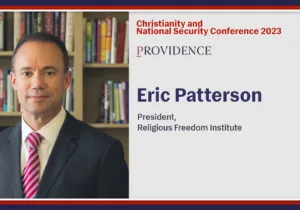Most Americans are sick and tired of our deeply polarized and petty political discourse that pours forth through our TVs, computers, and iPhones in a constant 24-hour stream. We see a near-continual generation of false and petty controversies designed for nothing other than to win the news cycle and cynically score points in the tug-of-war between our two political parties. The way our politicians behave is disheartening because it is so transparently self-serving, even though they claim virtuous and selfless motives. They are fooling no one.
If any of this resonates with you, then you may be tempted to flee politics, leave the mess and ego-filled arena to wolves so that they can devour themselves. That’s the way I often feel. And at times we may think that our Christian faith requires us to leave it as well. We can do more good serving the homeless or as a missionary overseas than serving the false gods of American political power that so many in Washington seem to worship in an endless bonfire of the vanities.
Many pastors counsel, either explicitly or implicitly, that the Gospel calls us away rather than toward the vocation of politics. When surveying the various leaders in the new Reformed movements across the US, I struggle to find preachers and pastors who intentionally seek to train, teach, and equip men and women to pursue the important vocation of politics. On culture there is plenty of material and interest, but politics is another story. I believe that it is because many, whether they do so consciously or unconsciously, do not think that politics is in fact a godly vocation. Maybe it is a necessary evil, or maybe it’s a decent vocation. But it’s no different than any other vocation and so does not require special emphasis. If you really want to serve God, the implicit message often is, then go into ministry or become a missionary.
That is not true, and it is in fact dangerous. Politics is essential for any working society, let alone a thriving one, and to the extent that Christians abandon politics or leave it to the jackals, society will suffer. Leadership matters. We know this is the case with congregational leadership. Political leadership is no different. Moreover, politics is the one area that the Bible does treat directly and affects human lives in profound ways. If you get politics wrong, the suffering can be great, as twentieth-century history exhibits in stark colors. We admire Winston Churchill for his courage in face of such dire circumstances, but the collapse of Europe prior to the Battle of Britain shows us a model of terrible leadership that brought Europe to the brink of being under the subjugation of two of the evilest humans to have walked the earth.
Yes, we must guard against the temptation to baptize America and align its purposes with God’s. They are not the same, and the idolatry that many evangelicals exhibit in terms of America’s purposes in the world must be checked and guarded against. But we must also guard against the temptations of Stanley Hauerwas and many younger evangelicals to merely see America and all nations as only so much greed and power in pursuit of domination and riches. Politics is rough and tumble, and it is filled with much that is unsavory and ugly. But it is also a theater for the glory of God’s rule to be exhibited. The protection of peace and prosperity through soft and hard power provides inestimable goods for human beings that should not be dismissed or downgraded.
Many evangelicals are explicitly challenging the received civil religion that yoked Christian faith to the founding and purposes of America. This feels like a liberation to many, and surely too many evangelicals have been raised in a context that melds the two together. But the answer is not to merely denounce and separate ourselves from government in order to purify the faith. Rather, the harder and more necessary task is to encourage and raise up men and women who have a stronger grounding in the Gospel, theology, ethics, politics, and history that will allow them to take up the mantle of leadership without allowing politics to consume them. Like Frodo, who bears the weight of the ring as an act of courage and love, those who enter the political arena must be equipped for the challenges, stresses, and temptations that will beset them on all sides. But the one option we cannot embrace is to merely remove ourselves from the public square, regardless of those who would counsel otherwise.
Rereading a post by John Piper from 2016, I was struck by how he—while emphasizing the great good of missionary work and the need for American Christians to take their eyes off of our demoralizing politics and focus them upon God and the call to serve the nations—sets up an implicit contrast between dirty and sinful American politics and missions. I doubt it was intended by Piper and I am sure he was just trying to encourage people to go into missions, but too often pastors fail to see politics as a mission field that requires encouragement and training, just like our missionaries.
Politics is a vocation, a godly vocation, in fact. The recent passing of President George H.W. Bush was an occasion for me to appreciate the life of this devoted public servant who pursued politics from a deep sense of vocation that grew out of his faith.
The goal of course is not to make America “a Christian nation” again, if it ever was one, or to seek to change America through the political process. Those dreams of the political right are a fool’s errand. The diversity in American society is not going away, and any politician in local, state, or federal government will realize the depths of our divisions palpably. Passing good laws is important, but so is leadership and character. The survival of our democracy requires principled leaders willing to make the hard, principled decisions that have defined American leadership at its best.
What if churches, seminaries, colleges, and other institutions in America sought to make cultivating leaders of character and faith who were grounded in the long history of Western and Christian politics a major priority? What if we specifically sought to train people for service in politics, not for the zero-sum scorched-earth politics of our current moment, but a politics that was a service both to God and neighbor. A politics that was realistic about human nature and our imperfectability and the need for American leadership in the world, not only for our own benefit but for a stable world order that will benefit many. Christians must do more than rail against the sins of our political leaders. We should be raising up and forming men and women who are called to take up the mantle of leadership in a world that is starved for principled and wise leadership.
Daniel Strand, a Providence contributing editor, is a postdoctoral fellow in the Center for Political Thought and Leadership at Arizona State University. His scholarly interests are in the history of political thought, religion and politics, and the thought of St. Augustine of Hippo.
Photo Credit: By Phil Roeder, via Flickr.







 Sponsor a student for Christianity & National Security 2024
Sponsor a student for Christianity & National Security 2024